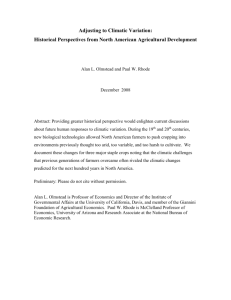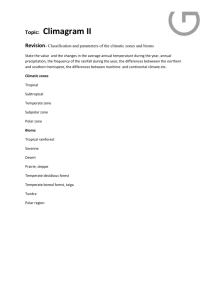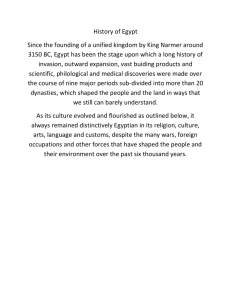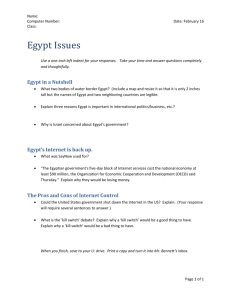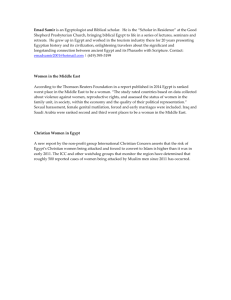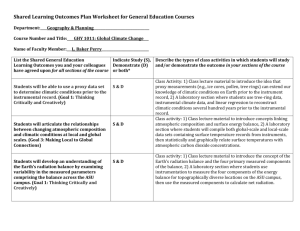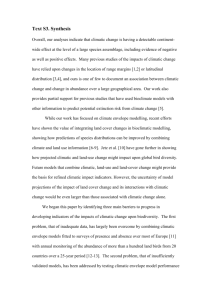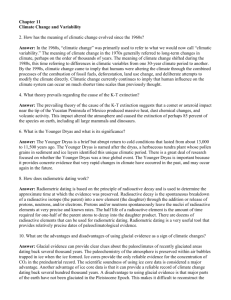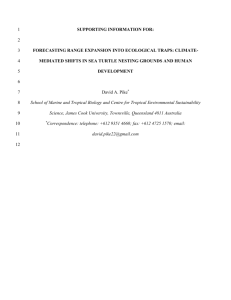Position Paper The Blagoevgrad International Model United Nations
advertisement
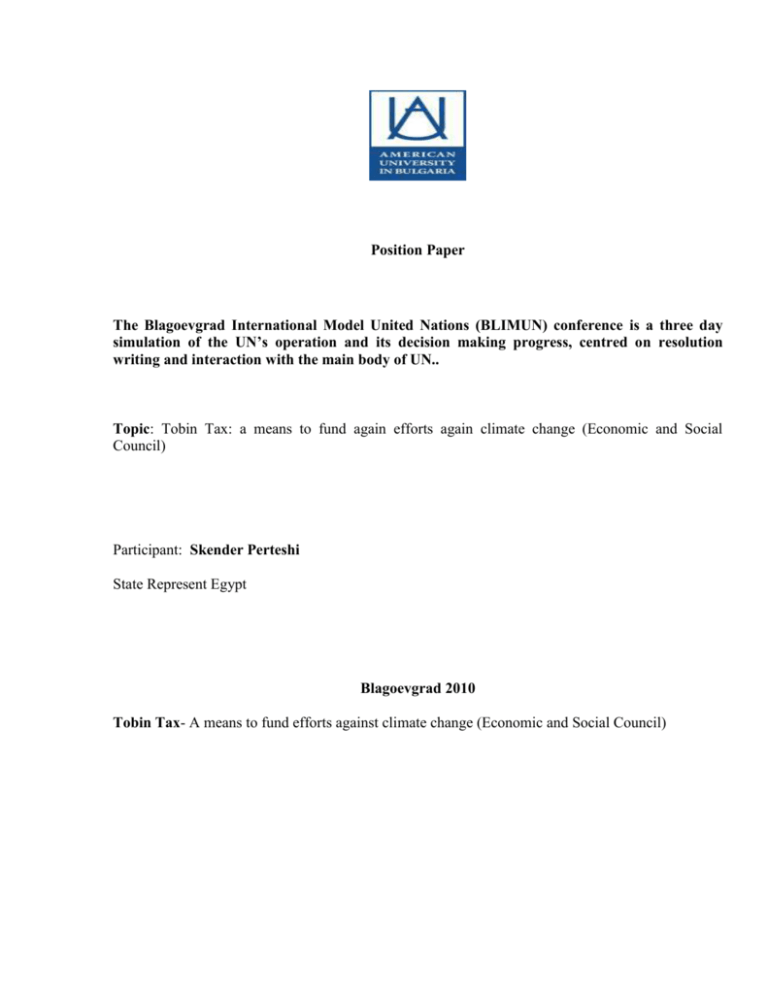
Position Paper The Blagoevgrad International Model United Nations (BLIMUN) conference is a three day simulation of the UN’s operation and its decision making progress, centred on resolution writing and interaction with the main body of UN.. Topic: Tobin Tax: a means to fund again efforts again climate change (Economic and Social Council) Participant: Skender Perteshi State Represent Egypt Blagoevgrad 2010 Tobin Tax- A means to fund efforts against climate change (Economic and Social Council) Introduction Egypt is located on the North- East corner of the African continent with a surface area about one million square kilometres, representing about 3% of Africa1 Global climate change is one of the more serious challenge to face Egypt and it is manifested in a variety of ways which include effects on water resources, agriculture, food resources and coastal zones2 amongst others. Debates and discussion across the global field of international relations intensified after the Cold War., This problematic issue was explicitly proclaimed as one of the main global challenges as well as a threat to global security . During such discussions and debates the world’s economic powers failed to achieve any agreement, in relation to climatic change in such areas as the need to reduce the amount of carbon in atmospheres to only 16% by 2020, investment in new technology, supporting a fund to fight the climatic change, and supporting regard to supporting under-developed countries, specifically in relation to their economic and agricultural sectors. The term Climate Change and the idea of Environmental Security is now the main point on the agenda in international relations summits and agendas to prevent environment change are plentiful in academic journals. This concept can be seen as a major threat for national and international security. The coordination plan to react to climate and environmental changes was very poor, indeed, the last Copenhagen Summit did not produce any agreement. The changing climate is not a short term threat nor is it caused by one state. It is a long term process and as the result will affect all countries to a greater or lesser extent, therefore, a collective reaction and united decision is necessary. Fundraising against Climate Change –The Arabian Republic of Egypt is leading the campaign to encourage the Middle Eastern States to find solutions to the problem of climate change and to be part of the international reaction to reduce CO2 in the Atmosphere. Some international organizations are trying to offer a fund to help the project to protect countries from climatic changes. The Climatic Change3 Knowledge Network brings together hundreds of organizations from developing and developed countries. It’s aimed at promoting more effective, sustainable and equitable climate change regimes through timely reactions to threats. USAID’s Climate Change Program is managed by over the 35 field missions with oversight provided by the WDC, climate Change Team. This programme has helped transitional and developing countries to strengthen their participation within the UN Framework Convention on Climate Change. 1 Zahran and Willis 1992 Pauld Williams Security Studies 2009 3 www.climate.org/topics/international-action/egypt.html 2 This programme has focused its works in three sub– regional areas: Central America, Central Africa and Central Africa.4 USAID address climate change through technical assistance to help countries develop strategies related to policy reform, institutional capacity building of their Technology Corporations and transfers, and to promote education of the causes of climate change.5 The geological record shows that in the past, climate change has sometimes been sudden rather than gradual. There is no reason to suspect that future changing of the Earth’s climate system, already under stress by the rise in carbon dioxide and other GREENHOUSE gases will either be slow and smooth or precisely predictable. Climate Changes: Risk and Threats A changes to the environment is attributable to human activities across the globe. In the formulation of ideas of Human Security, the causes of insecurity were numerous, and environmental change is one of seven major components of insecurity. Global warming, ozone layer depletion, the presence of more greenhouses gases, a decline in global biodiversity and the destruction of both oceanic and territorial habitats are all factors which contribute to climate change.6 Risks and threats: -Rising sea levels: some regions and territories are endangered by rising seas. Low lying land in the Nile Delta region is considered to be especially at risk form any sea level rises which are the result of global warning.7. As well as this, the Mediterranean Sea is particularly vulnerable to sea level rises because of the coast’s relatively low elevation, as a result area of high vulnerability in the Nile Delta and possible socio economic impact have been generally defined. These high risk areas include coastal cities such as Alexandria, Port Said, Matrouh, and Lake Bardawill. 8 Water supplies and Food Insecurity- The Climate is a fundamental driver of the water cycle. It determines how much water is available (supply) and how much water we need 9 (demand) in the short and long term. In the short and medium term, weather patterns determine variability in water supply and demand on a day-to-day and season-to-season basis – the weather in one year may be drier or wetter than the last.10 The long term climate, that is the average weather over a certain period, differs from decade to decade. This alters our perception of what we regard as the normal climate. In eastern Australia the 4 International Institute for Sustainable and Development, Report: Vulnerability of North African Countries to Climate Changes, Adaptation and Implementation Strategies for Climate Change. 5 Ibid: 6 Allan Collins: ( Contemprorary Security Stidies 2007. 7 El Rale et al. 1995 8 Sestini 1989, El Raile et, al, 1995 9 http://www.csiro.au/science/climate-and-water-supply.html 10 Ibid: period from 1900-40 was generally drier, while the period from 1940-80 was generally wetter. In recent decades the climate has been getting generally drier. In countries such as Egypt, Ethiopia and other regions in Africa and other countries are at risk from insecurity floods. The drought of a territory, floods of agricultural products, and agricultural lands has caused severe problems and hardships for populations of these places. UN- Framework in Climatic Changes – The United Nations has approved the framework to regulate the causes of climatic changes, and states are suggested to sign that agreement.11 Bibliography 1. Zahran and Willis 1992 2. Pauld Williams Security Studies 2009 3. Allan Collins: ( Contemprorary Security Stidies 2007. 4. Sestini 1989, El Raile et, al, 1995 5. United Nations Framework on Climatic Change 6. International Institute for Sustainable and Development, Report: Vulnerability of North African Countries to Climate Changes, Adaptation and Implementation Strategies for Climate Change 7. www.climate.org/topics/international-action/egypt.html 8. http://www.csiro.au/science/climate-and-water-supply.html 9. http://www.eeaa.gov.eg/ecc/ClimateMain.htm 10. http://www.islamonline.net/servlet/Satellite?c=Article_C&pagename=Zone-EnglishHealthScience%2FHSELayout&cid=1199108579572 11. http://english.cctv.com/program/newshour/20090923/103190.shtml 12. http://www.google.com/#hl=en&q=egypt+and+climate+change&start=10&sa=N&fp=37cc 007d907fcf6c 11 See. United Nations Framework on Climatic Change
